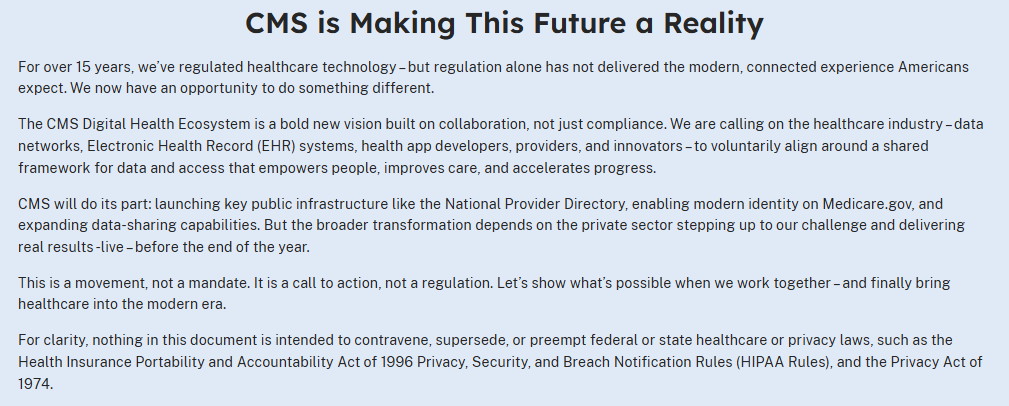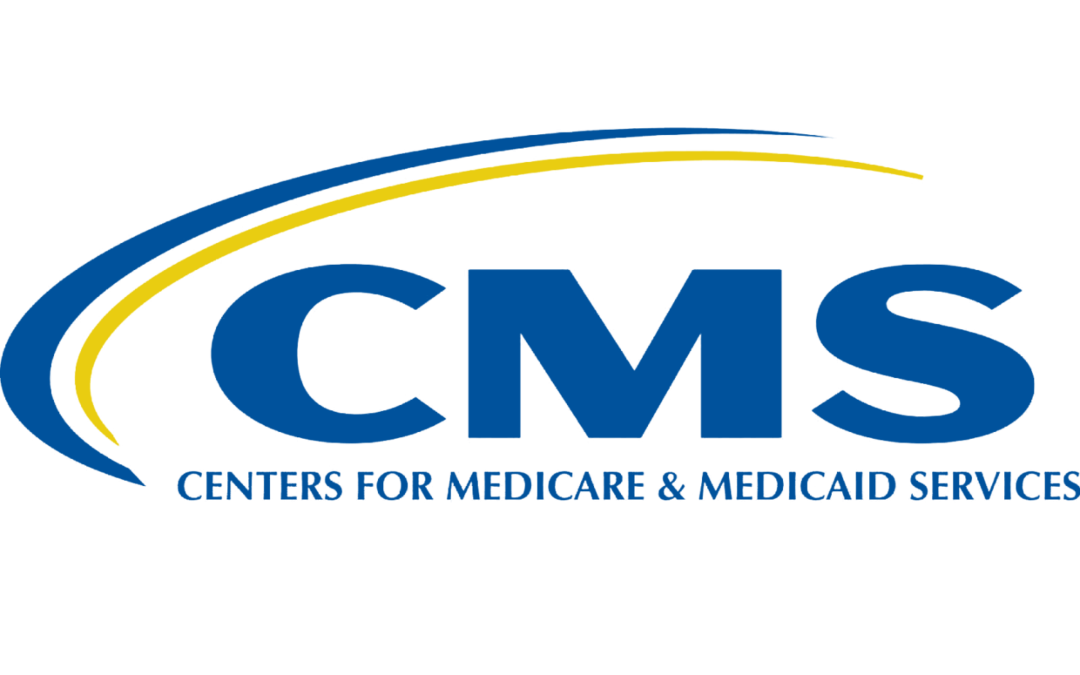- White House, Tech Leaders Commit to Create Patient-Centric Healthcare Ecosystem | CMS
- Health Technology Ecosystem | CMS
“For decades, bureaucrats and entrenched interests buried health data and blocked patients from taking control of their health,” said HHS Secretary Robert F. Kennedy, Jr. “That ends today. We’re tearing down digital walls, returning power to patients, and rebuilding a health system that serves the people. This is how we begin to Make America Healthy Again.”
“We are calling on the healthcare industry – data networks, Electronic Health Record (EHR) systems, health app developers, providers, and innovators – to voluntarily align around a shared framework for data and access that empowers people, improves care, and accelerates progress. CMS will do its part: launching key public infrastructure like the National Provider Directory, enabling modern identity on Medicare.gov, and expanding data-sharing capabilities. But the broader transformation depends on the private sector stepping up to our challenge and delivering real results – live – before the end of the year. This is a movement, not a mandate. It is a call to action, not a regulation. Let’s show what’s possible when we work together – and finally bring healthcare into the modern era.”
During a White House “Make Health Tech Great Again” event hosted with the Centers for Medicare & Medicaid Services (CMS), the Trump Administration secured commitments from major healthcare and information technology firms – including Amazon, Anthropic, Apple, Google, and OpenAI – to begin laying the foundation for a next-generation digital health ecosystem that will improve patient outcomes, reduce provider burden, and drive value.
The Administration’s efforts focus on two broad areas: promoting a CMS Interoperability Framework to easily and seamlessly share information between patients and providers, and increasing the availability of personalized tools so that patients have the information and resources they need to make better health decisions.
At the White House event, CMS unveiled voluntary criteria for trusted, patient-centered, and practical data exchange that will be accessible for all network types — health information networks and exchanges, Electronic Health Records (EHR), and tech platforms.
Click to check out an introductory video on CMS’ Health Tech Ecosystem initiative.
CMS plans to add an app library to Medicare.gov to highlight trusted, personalized digital health tools focused on prevention, chronic disease management, and cost-effective care navigation. CMS also provided an update on progress made on foundational efforts in support of a new digital health ecosystem and that enhance the beneficiary experience:
- Enhanced Plan Finder: CMS will update its own tools to enhance the beneficiary experience, such as the Plan Finder that helps Medicare beneficiaries select which plan is best for their personal needs. This update will ensure that beneficiaries can select plans that have their preferred providers and hospitals in network. All proposed plans would protect privacy, secure personal health information, and comply with HIPAA requirements.
- National Provider Directory: CMS has begun building a Fast Healthcare Interoperability Resources (FHIR)-based Application Programming Interface (API) to enable apps to find provider networks, participants and relevant endpoints, while also improving data quality and mapping complex provider hierarchies. The agency will be launching initial functionality of the new provider directory and expand iteratively starting later this year.
- Modern Identity for Medicare.gov: CMS is working to add modern digital identity to Medicare.gov this year, exploring approaches that enhance security without disrupting current user accounts and services.
- Faster Blue Button Data: CMS is developing infrastructure to reduce the time between when claims are received and when they become accessible through Blue Button, accelerating data availability for patients and developers. Additionally, FHIR-based digital insurance cards will be available as soon as this year to app developers and Medicare.gov users.
- Data at the Point of Care (DPC): CMS is working to integrate digital identity and National Provider Directory validation into DPC during its continued development.
- Trusted Exchange & CMS-Aligned Networks: As a major step forward, CMS announced today the new CMS-Aligned Networks concept based on the CMS Interoperability Framework. CMS is leading by example and plans to participate in trusted data exchange by responding to patient and provider queries and sharing Blue Button claims data through CMS aligned networks as early as the first quarter of 2026. For the first time, patients will be able to access their data using modern identity solutions, without needing to set up accounts and remember usernames and passwords for each healthcare website. This leap will dramatically improve how patients can securely access and share their records across the healthcare ecosystem.
Click here for the latest information on CMS’ Health Tech Ecosystem initiative.


Dr. Fife is a world renowned wound care physician dedicated to improving patient outcomes through quality driven care. Please visit my blog at CarolineFifeMD.com and my Youtube channel at https://www.youtube.com/c/carolinefifemd/videos
The opinions, comments, and content expressed or implied in my statements are solely my own and do not necessarily reflect the position or views of Intellicure or any of the boards on which I serve.




Wow this seems like meaningful change! They may have to reduce some of the current regulations restricting how we treat information first, but definitely a positive direction.